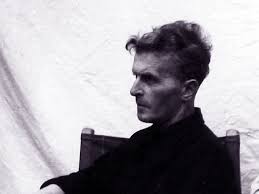Ghost Of Wittgenstein

We revisited Philosophical Investigations by Ludwig Wittgenstein last night. The Investigations are just that. Wittgenstein used his classroom lectures as an opportunity to do original research with his students. His method was to have a free ranging dialog with the class, doing philosophy of language. Notes of these lectures were published posthumously. The Philosophical Investigations is regarded as the most influential work of philosophy published in the 20th century.
I mentioned that reading Wittgenstein has changed my life. I meant that quite literally. I was asked to read the book, On Certainty as an undergraduate student and write a response essay. My life at the time was roiled with anxiety, and profound uncertainty resulting from my upbringing as a Evangelical fundamentalist Christian. If you have been a part of that scene you know how extraordinarily important it is to have a dogmatic- certain knowledge about many things. The thin volume entitled On Certainty was another collection of lecture notes published after Wittgenstein’s death. His ruminations on language showed that it is possible to be certain about very little. The conclusion is a consequence of how language works. And the good news is: That is Ok. I got the message and have never forgot the dawning of that insight. It was my get-out-of-jail-free card.
Here are several interesting quotations from The Investigations.
11. Think of the tools in a tool-box: there is a hammer, pliers, a saw, a screw-driver, a rule, a glue-pot, glue, nails and screws.—The functions of words are as diverse as the functions of these objects. (And in both cases there are similarities.) Of course, what confuses us is the uniform appearance of words when we hear them spoken or meet them in script and print. For their application is not presented to us so clearly. Especially when we are doing philosophy.
12. It is like looking into the cabin of a locomotive. We see handles all looking more or less alike. (Naturally, since they are all supposed to be handled.) But one is the handle of a crank which can be moved continuously (it regulates the opening of a valve); another is the handle of a switch, which has only two effective positions, it is either off or on; a third is the handle of a brake-lever, the harder one pulls on it, the harder it brakes; a fourth, the handle of a pump: it has an effect only so long as it is moved to and fro.
18….Our language can be seen as an ancient city: a maze of little streets and squares, of old and new houses, and of houses with additions from various periods; and this surrounded by a multitude of new boroughs with straight regular streets.
19. It is easy to imagine a language consisting only of orders and reports in battle.—Or a language consisting only of questions and expressions for answering yes and no. And innumerable others.——And to imagine a language means to imagine a form of life.
38…..This is connected with the conception of naming as, so to speak,an occult process. Naming appears as a queer connexion of a word with an object.—And you really get such a queer connexion when the philosopher tries to bring out the relation between name and thing by staring at an object in front of him and repeating a name or even the word “this” innumerable times. For philosophical problems arise when language goes on holiday. And here we may indeed fancy naming to be some remarkable act of mind, as it were a baptism of an object. And we can also say the word “this” to the object, as it were address the object as “this”—a queer use of this word, which doubtless only occurs in doing philosophy.